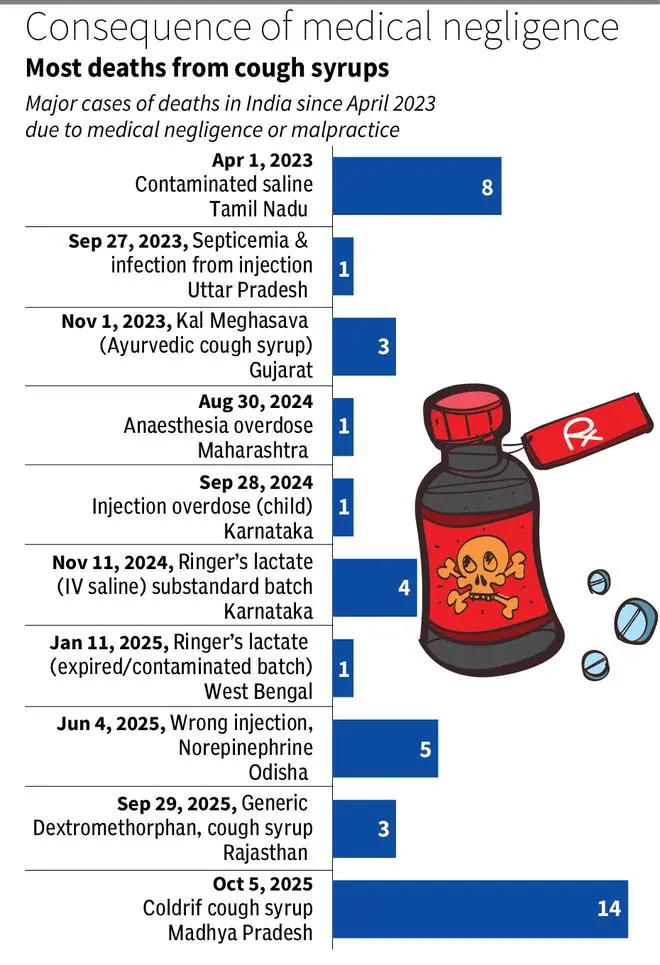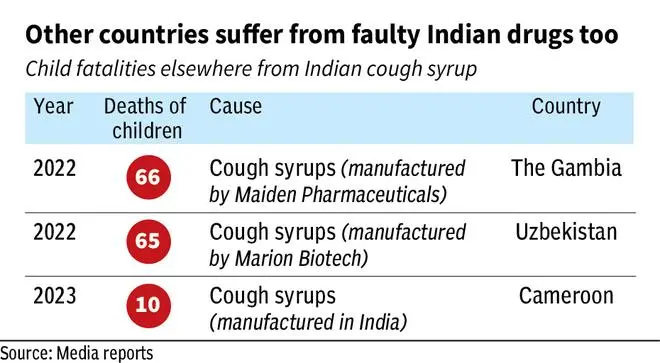Following the recent deaths of 14 children in Madhya Pradesh linked to contaminated cough syrup, an analysis of data reveals a troubling pattern. Fatalities due to medical negligence or malpractices have been recurring regularly since 2023. There were at least 12 fatalities due to medical reasons in 2023, 6 in 2024 and 23 so far in 2025.
The causes range from contaminated drugs, wrong injections, and administrative negligence. The crisis extends beyond India’s borders, with Indian-manufactured cough syrups causing significant child fatalities in other countries.


Children bear the brunt
businessline’s analysis highlights that children are disproportionately affected by faulty medicines. Recent syrup-related tragedies in Rajasthan and Madhya Pradesh killed 17 children. Internationally, Indian-manufactured cough syrups were responsible for the deaths of at least 141 children in The Gambia, Uzbekistan, and Cameroon between 2022 and 2023. These deaths persist due to a combination of lax regulatory oversight, failure to blacklist negligent manufacturers promptly, and the continued supply of substandard medicines, especially under public health schemes.
Systemic negligence
Beyond cough syrups, fatal medical errors keep recurring in India. Cases range from contaminated saline in a Tamil Nadu dental clinic that led to a neuromelioidosis outbreak claiming eight lives, to wrongful injections and anaesthesia overdoses in hospitals across Uttar Pradesh, Maharashtra, and Karnataka. While responses have included sealing facilities, suspending licences, and blacklisting pharmaceutical companies like ‘Kayson Pharma’ and ‘Sresan Pharmaceuticals’, measures have usually been either too little or too late. The private dental clinic in northern Tamil Nadu was only sealed in June 2025, more than two years after the outbreak. Many cases from 2024 and 2025 continue to be labelled under “ongoing investigation”.
Then there are administrative issues, where even when one State flags certain products as faulty, the rest do not pick it up. This was observed during the Ringer’s lactate IV drip case, where even after 2 months of being banned by the Karnataka government, it was used by a West Bengal hospital leading to the death of one young mother.
Need for reform
From our analysis, we observed, children at almost 44 per cent and women at 17 per cent of the reported fatalities, are the most vulnerable victims of such malpractice (especially pregnant women, who account for 5 out of the total 7 recorded cases involving women). Their susceptibility to even minor medical errors or contaminated drugs turns routine treatments into fatal events.
The recurring nature of these incidents, often linked to substandard drugs from semi-blacklisted manufacturers, underscores a critical failure in enforcement. There is an urgent need for more disciplined drug regulation, stringent batch testing, and swift, transparent action against all entities responsible for these preventable deaths.
Published on October 7, 2025